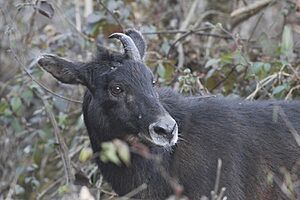Himalayan serow facts for kids
Quick facts for kids Himalayan serow |
|
|---|---|
 |
|
| Male Himalayan serow in Pangolakha Wildlife Sanctuary, Sikkim, India | |
| Scientific classification |
|
| Kingdom: | Animalia |
| Phylum: | Chordata |
| Class: | Mammalia |
| Order: | Artiodactyla |
| Family: | Bovidae |
| Subfamily: | Caprinae |
| Genus: | Capricornis |
| Species: | |
| Subspecies: |
C. s. thar
|
| Trinomial name | |
| Capricornis sumatraensis thar Hodgson, 1831
|
|
The Himalayan serow (Capricornis sumatraensis thar) is a cool animal that looks a bit like a goat or an antelope. It is also known as the thar (pronounced THAR or TAR). This amazing creature lives in the Himalayas, which are huge mountains in Asia.
The Himalayan serow is a type of mainland serow. A "subspecies" means it's a special group within a larger species, with its own unique features. People used to think it was its own separate species, called Capricornis thar. Today, the Himalayan serow is very important to the Indian state of Mizoram, where it is the official state animal!
Contents
Discovering the Himalayan Serow
In 1831, a person named Brian Houghton Hodgson was the first to officially describe this animal. He saw a goat-like creature with short, ringed horns living in the mountains. These mountains were located between the Sutlej River and the Teesta River.
At first, Hodgson called it "Bubaline Antelope". But that name was already taken by another animal. So, a few months later, he gave it a new scientific name: Antelope thar. Later, in 1838, another scientist named William Ogilby created a new group for animals like the serow, called the Capricornis genus. He decided that the Himalayan serow was the perfect example for this new group.
What Does a Himalayan Serow Look Like?
Himalayan serows have a unique look! Most of their body is a dark, blackish color. But their sides, back legs, and upper parts of their legs are a rusty red. Their lower legs are usually whitish. This mix of colors helps them blend in with their mountain home.
Where Do Himalayan Serows Live?
These interesting animals live in the hilly forests of the Himalayas. They usually prefer to stay at high places, above 300 meters (about 984 feet). However, when winter comes, they might move down to lower areas, sometimes as low as 100 meters (about 328 feet). In the Himalayas, they especially like to live at elevations between 2,500 and 3,500 meters (about 8,200 to 11,500 feet).
Protecting the Himalayan Serow
The Himalayan serow, as part of the Capricornis sumatraensis species, is listed in CITES Appendix I. This means it is a very protected animal. CITES is an international agreement that helps control the trade of wild animals and plants. Being in Appendix I means that trading these animals is usually not allowed, to help protect them from becoming endangered.
 | Lonnie Johnson |
 | Granville Woods |
 | Lewis Howard Latimer |
 | James West |

